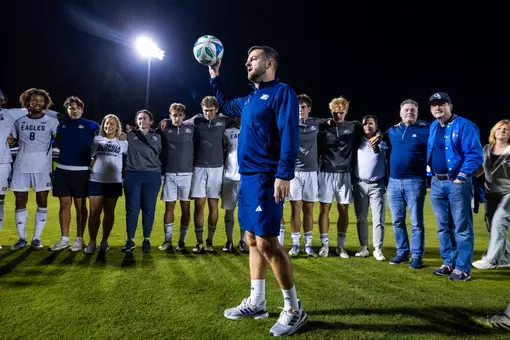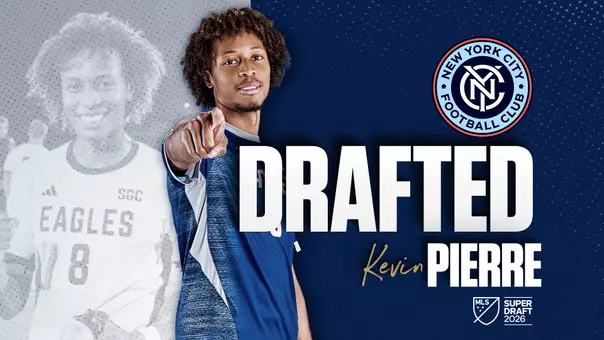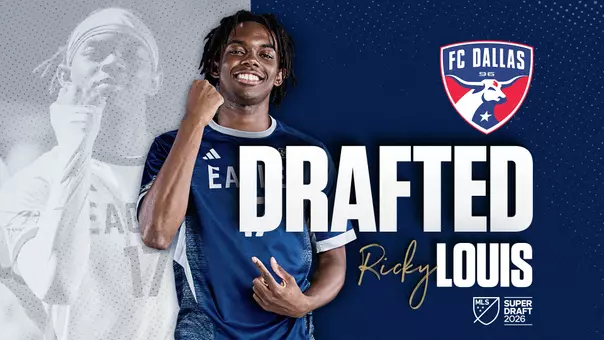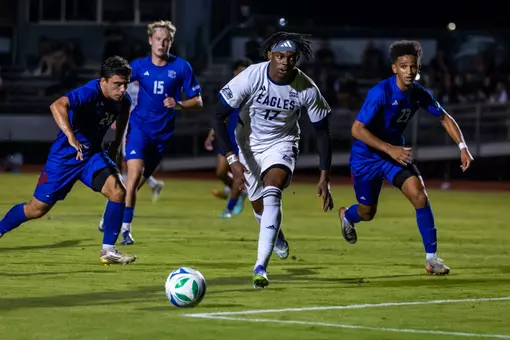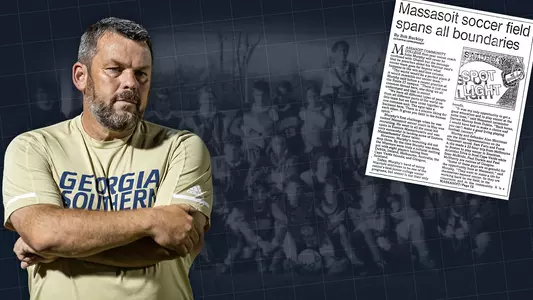
GS Men's Soccer Coach John Murphy Looks Back At His First Head Job 25 Years Ago
8/27/2019 1:30:00 PM | Men's Soccer
STATESBORO - Georgia Southern Head Men's Soccer Coach John Murphy has experienced plenty of success throughout his coaching career, both collegiately and professionally. That has continued through his three seasons in Statesboro - the Eagles have captured a Sun Belt Conference regular season title, played for a Sun Belt tournament title and recorded the highest season-ending RPI since the NCAA began tracking those numbers.
The long journey that brought the Quincy, Massachusetts, native to the Eagles is an intriguing one, but what has sparked the successful coaching career of the man dates back to an important anniversary he will be celebrating this season.
As a collegiate player, Murphy attended Massasoit Community College and helped the Warriors capture the 1986 NJCAA National Championship as a goalkeeper. Six years later, Murphy would be elevated at Massasoit to become the head coach for the powerhouse junior college, taking over the team for the 1994 season.

The lessons learned and experiences shared by Murphy and his 1994 team resonate today and really have driven the desire for success that he's brought into every successive job since then.
"When the athletic director, who was also the head coach, approached me about taking the job, I didn't think I was ready," Coach Murphy said. "I was 27 years old. I had so much reverence for the program, that I didn't want to let anyone down. But he felt I was ready, and I think he was right, because as soon as I took the job, I was very aggressive in recruiting."
Jeff Negalha, an All-Region performer at Massasoit who currently serves as an assistant men's soccer coach at NC State, agrees. "He was very thorough in his recruiting, and brought a lot of talented players to Massasoit." And it wasn't just domestic players either. The team that Murphy assembled in 1994 covered the world.
"The 1994 team was filled with so many different characters, different nationalities, that just jelled from the get-go," Sean McBride, a 1994 NSCAA All-American at Massasoit said. McBride currently coaches and teaches at the high school level in Birmingham, Alabama. "That team was filled with characters both on and off the field. They loved to play the game, and we were like little kids at times, just excited to get on the field and play."

The diversity of the team's makeup was clearly a strength, according to Coach Murphy. "I think when you have kids from different backgrounds, they eventually come together and it becomes a powerful thing," he said. "It's sometimes more volatile and emotional in the short term, but in the long term, it becomes a strength."
"It was a really cool training environment," Negalha said. "Obviously it was a higher level than in high school and in club, but with that talent, the training I can always remember was at such a high level with the intensity. We trained the way we wanted to play, and a lot of it translated."
When the roster was finally completed, Coach Murphy had a squad that featured several Northeastern U.S. players, along with eight players from Dublin, Ireland; Melbourne, Australia; the Cape Verde Islands and Glasgow, Scotland.
"We got two kids from Glasgow and one from Edinburgh that year," Coach Murphy recalled. "And here 25 years later, we've got a kid from Glasgow and one from Edinburgh at Georgia Southern."
One of those initial Scottish players was McBride, who points to Coach Murphy's work ethic as a pivotal reason why be became the first American citizen to land a coaching job in British professional football, working in Scotland for Livingston FC of the Scottish First Division in 2009.
"You do not become the first American coach to work in Scottish football unless you have studied, believed in your abilities, and have always been up for a challenge," McBride said.
The challenge of molding all of the different cultures, backgrounds and talent in that 1994 team resulted in an explosive offense that scored more than 122 goals, a then-junior college record. But that squad would fall in the NJCAA national semifinals, losing a heartbreaking 3-2 decision to Spartanburg Methodist JC after holding a 2-0 lead.
"It was gut wrenching, falling short after being so close, another one of Murphy's players on that squad, Sam Faris, said. Faris was 1994 NJCAA All-American at Massasoit and currently teaches high school English in Rome, Italy. "John also took it hard. But after chatting with him recently, he told me 'had I known then what I know now, we would be wearing a championship ring on our fingers.'"
There was still a tremendous amount of success that the team experienced that season, in addition to the berth in the NJCAA's final four, both on and off the field. The team was named the NJCAA's Academic Team of the Year by the organization, captured the Colonial States Athletic Conference championship as well as the NJCAA Region XXI championship. Murphy was named not only the CSAC Coach of the Year, but hte NSCAA New England Region Coach of the Year. Five players, including McBride and Faris, were named to the NJCAA All-Region squad.
And clearly, Coach Murphy has taken the lessons from coaching that 1994 team and applied them throughout his long and distinguished career.
"I think it's a measure of Coach Murphy as a man, and as a coach, that everywhere he has went, he has been successful," McBride said. "I think he has evolved with the game, and taken each new role as a challenge, whether at the collegiate level, or the professional level."
"Coach Murphy was always on the forefront of education," Negalha said. "From the licensing and credentials from a soccer perspective - every time I talk to him, he's learning. With all these initiatives he's taken, it's helped him become better and the colleagues around him become better."

Fast forward to the upcoming 2019 season, and it's clear to see that Georgia Southern has benefited from the experience and work ethic forged a quarter of a century ago in Massachusetts.
"I think we've done that in the three years that I've been here," Coach Murphy said about assembling diverse teams that can come together. "But I was doing that 25 years ago. It's nice to look back and see that there's been a lot of personal growth since 1994, that a lot of things I'm doing today are based on things I was doing and learning when I was just 27 years old."
This year's edition of the Eagles features, along with the two Scottish players already mentioned, two players from Iceland and England along with ones from Spain, Germany, Norway, Brazil, Canada. Included in that are domestic players from seven different states.
"I'm fortunate to be in a great state for soccer here in Georgia," Coach Murphy said. "But I'm looking for good players wherever. I felt I've always had eclectic, interesting teams."
Asking the coach if the collegiate game has changed drastically in those 25 years, Coach Murphy said, "The difference now is that the average player is much better than they were in the mid-90s. But I don't think the kids have changed. Kids want to be held to a standard, to have coaches know what they're talking about and have a vision. In that regard, I don't think that much has changed.
"I think the trends in the college game from 25 years ago suit the way that I work. I don't think I was ahead of my time, but I have been working in this manner for quite a long time. Some coaches who are my age might not enjoy it, but I enjoy kids challenging me because I challenge them."
That brings Murphy full circle to that first head coaching job at Massasoit, and a true circle it has been. Since leaving Massasoit, Murphy has worked at virtually all levels of soccer - from Division I assistant coaching stints at Brown University (1995-97), Clemson (2010-11) and Boston College (2014-15) to his head coaching experience at Assumption (1998-2000), Anderson (S.C.) (2012-13) through his professional stops at the MLS' New England Revolution (2000-03), Columbus Crew (2004) and Colorado Rapids (2005-08) along with his stint in Scotland at Livingston FC. Coaching around the country and around the world has earned the respect of his peers and colleagues, but it started with earning the respect of the first players he shepherded as a head coach in 1994.
"Coach Murphy was the type of coach that all of the players could relate to," McBride said. "He treated all of us the exact same, with the exact same level of respect, whether you were a starter, or number 24 on the roster."
"John's persona, character, Irish grit and down-to-earth personality made him a pleasure to work with on the field and easy to be around off of it," Faris said. "His tactical sense, detailed player management and inherited hard work ethic made us formidable opponents."
The Georgia Southern men's soccer season opens up on August 30th in Charleston, S.C. Another season-opener in a long list of openers he's been a part of since that monumental one in the Fall of 1994, but for Coach John Murphy, this one has the feeling that it could be special.
